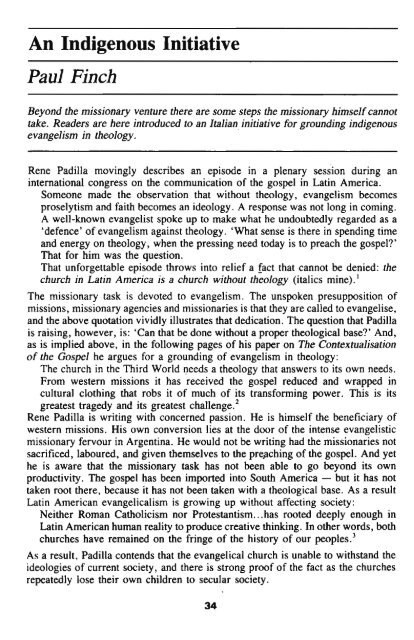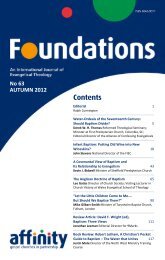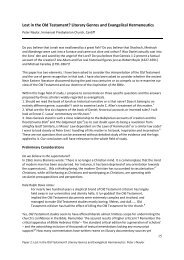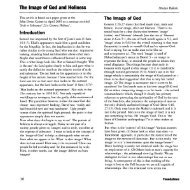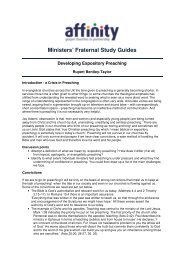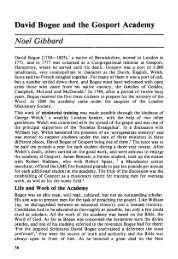An Indigenous Initiative Paul Finch - Affinity
An Indigenous Initiative Paul Finch - Affinity
An Indigenous Initiative Paul Finch - Affinity
You also want an ePaper? Increase the reach of your titles
YUMPU automatically turns print PDFs into web optimized ePapers that Google loves.
· <strong>An</strong> <strong>Indigenous</strong> <strong>Initiative</strong><br />
<strong>Paul</strong> <strong>Finch</strong><br />
Beyond the missionary venture there are some steps the missionary himself cannot<br />
take. Readers are here introduced to an Italian initiative for grounding indigenous<br />
evangelism in theology.<br />
Rene Padilla movingly describes an episode in a plenary session during an<br />
international congress on the communication of the gospel in Latin America.<br />
Someone made the observation that without theology, evangelism becomes<br />
proselytism and faith becomes an ideology. A response was not long in coming.<br />
A well-known evangelist spoke up to make what he undoubtedly regarded as a<br />
'defence' of evangelism against theology. 'What sense is there in spending time<br />
and energy on theology, when the pressing need today is to preach the gospel'<br />
That for him was the question.<br />
That unforgettable episode throws into relief a fact that cannot be denied: the<br />
church in Latin America is a church without theology (italics mine).!<br />
The missionary task is devoted to evangelism. The unspoken presupposition of<br />
missions, missionary agencies and missionaries is that they are called to evangelise,<br />
and the above quotation vividly illustrates that dedication. The question that Padilla<br />
is raising, however, is: 'Can that be done without a proper theological base' <strong>An</strong>d,<br />
as is implied above, in the following pages of his paper on The Contextualisation<br />
of the Gospel he argues for a grounding of evangelism in theology:<br />
The church in the Third World Qeeds a theology that answers to its own needs.<br />
From western missions it has received the gospel reduced and wrapped in<br />
cultural clothing that robs it of much of its transforming power. This is its<br />
greatest tragedy and its greatest challenge. 2<br />
Rene Padilla is writing with concerned passion. He is himself the beneficiary of<br />
western missions. His own conversion lies at the door of the intense evangelistic<br />
missionary fervour in Argentina. He would not be writing had the missionaries not<br />
sacrificed, laboured, and given themselves to the pre.aching of the gospel. <strong>An</strong>d yet<br />
he is aware that the missionary task has not been able to go beyond its own<br />
productivity. The gospel has been imported into South America - but it has not<br />
taken root there, because it has not been taken with a theological base. As a result<br />
Latin American evangelicalism is growing up without affecting society:<br />
Neither Roman Catholicism nor Protestantism ... has rooted deeply enough in<br />
Latin American human reality to produce creative thinking. In other words, both<br />
churches have remained on the fringe of the history of our peoples. 3<br />
As a result, PadiIIa contends that the evangelical church is unable to withstand the<br />
ideologies of current society, and there is strong proof of the fact as the churches<br />
repeatedly lose their own children to secular society.<br />
34
What the church was unable to give them in terms of a purpose in life and an<br />
adequate perspective from which to understand history, they have found in a<br />
secular ideal that in the end destroys their 'inherited faith'. 4<br />
What Padilla graphically describes from his third world context is, however, also<br />
sadly true of Italy, a first world missionary context. Here, too, the gospel has been<br />
preached. Some have been converted. There are pockets of Italian Christians. The<br />
evangelical church in Italy does exist. Numbering less than one tenth of one percent<br />
of the population, it is still a very tiny minority, but it has arrived.<br />
The issue which Padilla rai~es is: 'But has it taken root' <strong>An</strong>d when the questions<br />
are posed in his terms: Is creative thinking going on Is the church at the centre<br />
of Italian history Is there a developing theology from within Italy Has the<br />
missionary endeavour, from without and within Italy, put down roots which see an<br />
Italian fruit sprouting from Italian soil sadly the answers have to be 'no'. The great<br />
preponderance of Italian evangelical literature consists of translated titles from<br />
abroad. Most of the instruments of evangelisation have been created, and are still<br />
maintained, by foreign currency. If Padilla should ask: 'Where is the Italian John<br />
Stott' I would have to say I don't know. Worse still would be if he should ask:<br />
'<strong>An</strong>d where is the Italian J I Packer'. Italian evangelical theology is a nameless,<br />
anonymous waif.<br />
Until now, almost the whole enterprise of Italy has been done without a theological<br />
base. As Padilla would say: 'There has not been a new reading of the gospel from<br />
within the historical situation under the guidance of the Holy Spirit. ,5 <strong>An</strong>d as<br />
Italian society tends to follow patterns forged in the USA, so too, the Italian<br />
evangelical scene tends to imitate American evangelicalism. Her evangelistic<br />
methodology, her approach to Christian music, her growing number of large<br />
congresses all are assimilated from their foreign inheritance. They are forms of<br />
evangelicalism which have arrived, but they fail to produce an Italian fruit from<br />
Italian biblical creative nutrition.<br />
The words 'until now' stand at the head of the former paragraph because perhaps<br />
there is now a new beginning for Italy, a beginning which is uniquely 'hers'. It<br />
consists of a theological library/research centre which has been inaugurated last<br />
autumn in Padova (Padua) by a group of earnest and committed Italian believers.<br />
Known as IFED - Istituto di Formazione Evangelica e Documentazione (literally<br />
translated: Institute for Evangelical Formation and Documentation), the centre<br />
is dedicated to the formulation of a biblical conscience which expresses itself<br />
dynamically in all areas of life, or as Padilla would frame it: 'Theological thinking<br />
is not basically an intellectual exercise, but rather a discovery of the will of God<br />
regarding the practice of truth. ,6<br />
The chief expression of such thinking is the already well known theological<br />
magazine Studi di Teoiogia, a monograph of about 130 pages which comes out<br />
twice a year. The magazine, now in its 12th year, is unique in its kind in Italy, and<br />
the editor of the magazine, Prof Pietro Bolognesi (a product of Vaux-Sur-Seine),<br />
was undertaking a brand new step when he first began, back in 1978, with an<br />
edition on Biblical Hermeneutics, a step which previous missionary endeavour had<br />
failed to take.<br />
35
IFED is really that step which missionaries from overseas cannot take. For the first<br />
time in Italy, of Italian origin, of Italian creativity, a · study-centre, geared to the<br />
maturation and expression of evangelical theology has been born. The threewindowed<br />
locale, already housing some 3,000 volumes, is pleasantly situated in a<br />
quiet neighbourhood near to the centre of Padova.<br />
Besides being a library and central office for Studi di Teologia, IFED is also<br />
promoting two theological seminars per year. The first of these, in May 1989,<br />
focussed on the concrete necessity of solid theological foundations, and was<br />
introduced by Stuart Olyott. God willing, the second one was to be held in October<br />
on the whole question of Fundamentalism, endeavouring to articulate the categories<br />
behind the word which is so often controversial.<br />
IFED's desire is to promote biblical study and research in all areas of life, and not<br />
being a Bible School which \ requires continuous residence by the student, is<br />
available to all who want to involve themselves seriously in the research of God's<br />
truth as it applies to life.<br />
While the birth and developnifnt of the centre is a very significant step forward on<br />
the evangelical scene in Italy, \it is very obvious that IFED must develop ties with<br />
the worldwide church community. Although Prof Pietro Bolognesi himself serves<br />
on the Theological Commission of the World Evangelical Fellowship, this is not<br />
sufficient. Ties with God's people and like-minded institutions around the world<br />
must be developed in a real and meaningful fashion. Even when God has graciously<br />
raised up an Italian Dr Packer and an Italian Dr Martyn Lloyd-Jones, Italy's<br />
theological and evangelical growth must mature within the healthy confines of<br />
God's global church!<br />
The small, growing evangelical church of Padova, the churches in the immediate<br />
region, as well as other churches and believers scattered more to the south, covet<br />
God's blessing on this pew initiative. The vision is that IFED should exist not only<br />
for their benefit and welfare, but that in God's economy Italy might have her own<br />
centre of growing creativity, fertile biblical and theological research, something<br />
Rene Padilla longed for in the continent of South America, and something Italy so<br />
vitally needs too.<br />
Dr <strong>Paul</strong> <strong>Finch</strong> is British and is field-leader with WEe International in Italy<br />
References<br />
1. MISSION BETWEEN THE TIMES, Rene Padilla, Eerdmans, Grand Rapids, 1985, p95<br />
2. ibid, P 99<br />
3. ibid, P 102<br />
4. ibid, P 105<br />
5. ibid, P 104<br />
6. ibid, P 107<br />
36


